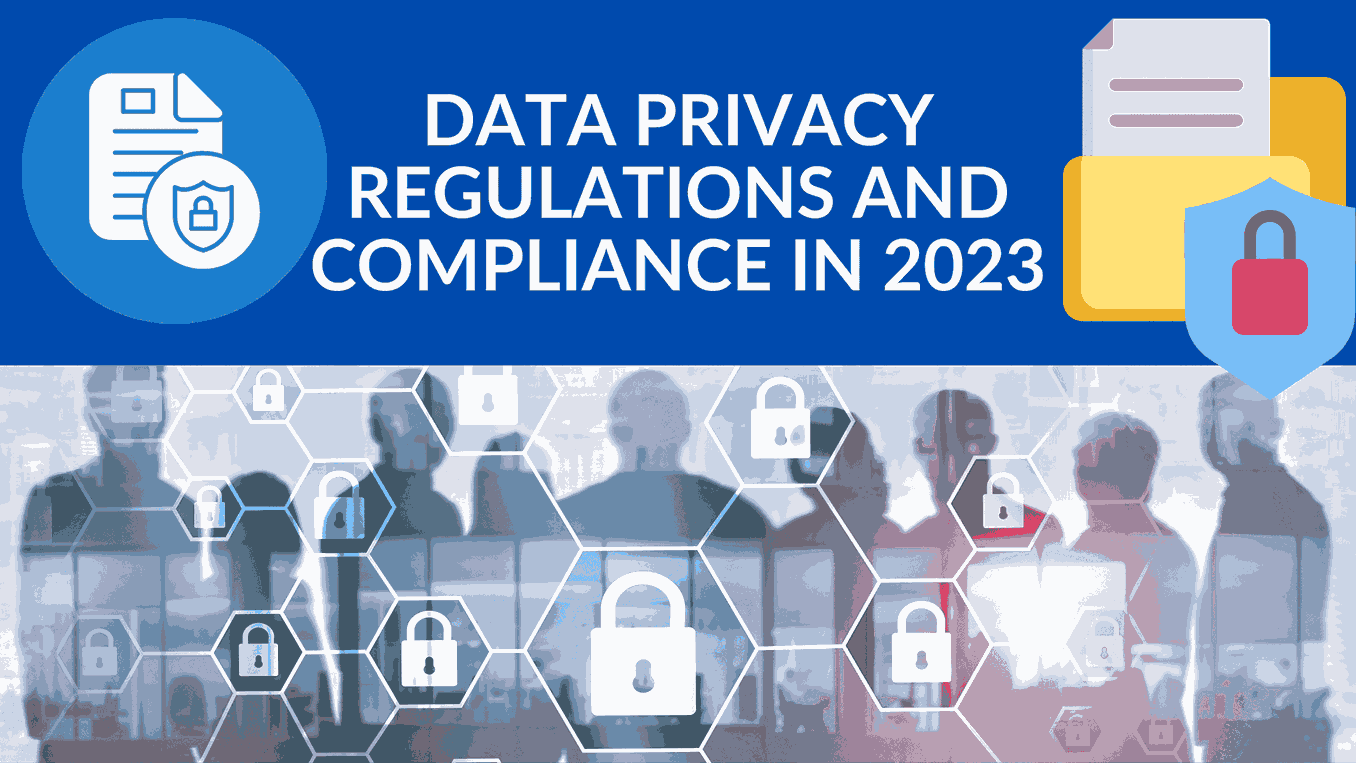Data privacy regulations and compliance in 2023
- Data as a Service (DaaS) Software Marketing & Analytics


Data Privacy Regulations and Compliance in 2023
In this digital-first era, where data privacy has become paramount, organizations must navigate a complex landscape of laws and regulations to safeguard personal information. As we enter the year 2023, it is crucial to stay informed and prepared.
From the EU’s General Data Protection Regulation (GDPR) to the California Consumer Privacy Act (CCPA), a multitude of data privacy laws have emerged worldwide.
Hence, it’s crucial for businesses serving their customers globally to understand every crucial data privacy and security regulations to ensure they comply with these regulations.
This comprehensive guide is your compass, providing a clear overview of the nine key data privacy laws shaping the year ahead. Gain valuable insights, understand compliance requirements, and equip your organization with the knowledge to protect sensitive data and honor the privacy rights of individuals.
Let’s look at some of the key data privacy laws for 2023, paving the way for a secure and trusted digital landscape.
9 Key Data Privacy Laws For 2023
1. General Data Protection Regulation (GDPR)
The GDPR, implemented by the European Union (EU), remains one of the most influential data privacy laws globally. It applies to organizations based in the EU and any entity that processes the personal data of EU citizens.
The GDPR mandates several vital principles, including lawful and transparent data processing, purpose limitation, data minimization, accuracy, storage limitation, and accountability. It also grants individuals rights such as the right to access their data, the right to be forgotten, and the right to data portability. Non-compliance with the GDPR can result in substantial fines, making it essential for organizations to implement robust data privacy practices and mechanisms.
2. California Consumer Privacy Act (CCPA)
The CCPA is a groundbreaking data privacy law in the United States aimed at enhancing the privacy rights of California residents.
It gives consumers the right to know what personal information is being collected about them, the right to opt out of the sale of their data, the right to request deletion of their data, and the right to non-discrimination when exercising their privacy rights.
3. Health Insurance Portability and Accountability Act (HIPAA)
HIPAA is a U.S. law designed to safeguard individuals’ protected health information (PHI). It applies to covered entities, such as healthcare providers, health plans, healthcare clearinghouses, and business associates.
HIPAA establishes stringent privacy and security standards for PHI, including limitations on the use and disclosure of PHI, requirements for secure storage and transmission of PHI, and the implementation of administrative, physical, and technical safeguards to protect PHI from unauthorized access or disclosure.
4. Colorado Privacy Act (CPA)
The Colorado Privacy Act is set to take effect on July 1, 2023, making Colorado the third U.S. state to enact comprehensive data privacy legislation.
The CPA grants Colorado residents rights over their data and imposes obligations on businesses handling it. It requires organizations to provide clear and concise privacy notices, obtain consumers’ consent for processing sensitive data, and allow individuals to opt out of targeted advertising or the sale of their data.
5. Virginia’s Consumer Data Protection Act (CDPA)
Effective January 1, 2023, the CDPA is Virginia’s state-level data privacy law. It grants Virginia residents specific rights regarding their data. It applies to businesses that meet particular criteria, such as those that process large amounts of consumer data or control the data of a certain number of consumers.
The CDPA focuses on transparency by requiring organizations to provide clear privacy notices and obtain consumers’ consent for processing sensitive data. It also establishes data protection measures, including requirements for data security and the implementation of data protection assessments.
6. New York Stop Hacks and Improve Electronic Data Security (SHIELD) Act
The New York SHIELD Act strengthens data privacy and cybersecurity requirements for businesses handling the private information of New York residents. It expands the definition of private information to include biometric data, email addresses, and usernames combined with passwords.
The act enhances breach notification obligations, requiring businesses to promptly notify affected individuals and relevant authorities in the event of a data breach.
7. Utah Consumer Privacy Act
The Utah Consumer Privacy Act is a comprehensive data privacy law similar to the CCPA and GDPR. It grants Utah residents certain rights over data and establishes obligations for businesses handling it.
The act requires businesses to provide transparent privacy notices, obtain consumers’ consent for processing sensitive data, and honor consumers’ rights to access, delete, and correct their personal information.
8. California Privacy Rights Act (CPRA)
Building upon the CCPA, the CPRA enhances privacy rights for California residents. It introduces new provisions related to sensitive personal information, including biometric and precise geolocation data.
The CPRA establishes data retention limitations, requiring businesses only to retain personal information for specified purposes. It also created the California Privacy Protection Agency (CPPA), a dedicated enforcement agency responsible for implementing and enforcing the CPRA’s provisions.
9. Gramm-Leach-Bliley Act (GLBA)
The GLBA is a U.S. law that aims to protect consumers’ financial information. It applies to financial institutions, such as banks, credit unions, and insurance companies, that collect, process, or store personal financial information.
The GLBA requires these institutions to provide privacy notices to consumers, explaining how their information is used and shared. It also mandates implementing safeguards to protect consumer data’s security and confidentiality.
In Conclusion Staying compliant with these data privacy laws is crucial for organizations to maintain customer trust, protect individuals’ privacy rights, and avoid costly penalties.
By understanding the requirements of each law and implementing appropriate data privacy practices, businesses can navigate the complex landscape of data protection and prioritize the security and privacy of personal information.
Unlock Exclusive Deals with Subscribed.fyi!
Subscribed.FYI offers a valuable platform for freelancers and small teams to manage their SaaS stack, making it easier to navigate the complexities of SaaS tools and expenses. With the ability to unlock secret deals and savings on over 100 SaaS tools, Subscribed.FYI Deals can help businesses save big while managing all their subscriptions in one place. By providing comprehensive insights and centralized information about SaaS tools, Subscribed.FYI empowers users to make informed decisions and stay compliant with data privacy regulations. For more information and to take advantage of the deals offered by Subscribed.FYI, visit their website and start unlocking savings on essential SaaS tools.
Relevant Links:
- Data Privacy Regulations in 2023: What to Expect and How Verify 365 is Complying
- Data Privacy Day 2023: Where Data Privacy Policy Stands at the Start of 2023
- Data Compliance Regulations
- Data Privacy Laws
- Stay Compliant with Data Privacy Laws in 2023
- Subscribed.FYI
- Subscribed.FYI Deals





